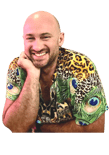James shares their Strengths journey

"In 2021, I didn’t know what I wanted to do next; I had just left a senior corporate role and knew that taking another significant role in a big organisation wouldn’t be right for me. I was incredibly fortunate that some friends offered me consulting work with their growing businesses.
Within a couple of months, I found myself recruiting talent and enjoying it—but the most fulfilling part of the process was working with Strengths Profile and supporting candidates' career expansion and development.
In 2024, I decided to make coaching my community with Strengths Profile the focus of my work.


I invite you to a 20-minute video call so we can discuss how a Strengths based approach can support your goals

...It amused me that every time I have seen a recruiter, they have offered me a job, and I have always said no. But it turns out I am good at and love it, and now I do it all the time for clients when we are looking at growing their organisations.
As a Performance Coach, I support LGBTIQ+ talent in succeeding at work. It always starts with career and business but often looks at all aspects of life as everything is connected.
As a Recruiter for my coaching clients, I use Strengths Profile to inform the talent identification and selection process, and I work with candidates to help them make the best possible career moves.
I support LGBTIQ+ talent to succeed in the workplace as their fully expressed authentic selves.
When thinking about a model that would achieve better-than-average results, I looked to my own work experience.
I have been around psychometrics and strengths-based development for more than twenty years.
My first experience of psychometrics was being rejected by the Civil Service graduate program in the UK just after University. Anyone who knows me or has worked with me for any period will know that the Civil Service probably isn’t the right environment for me to flourish. I am high on creativity and innovation and low on adherence; cliched but not what they were looking for in 2002. I wonder whether anything has changed.
My second experience was a couple of years later when I got an unexpected promotion based partly on my potential, evidenced by a psychometric assessment. My then-boss, a maverick, Deborah, made me the youngest and inexperienced manager in a business of about 800 people; it was a controversial move that paid off for everyone.
When I first moved to Australia in 2007, I was very fortunate to work for an organisation that has won many ‘Best Employer’ awards; at its core was a belief that treating people right and harnessing their potential will drive commercial success. As a strengths-based organisation, I was in the thick of it, practising daily. We enjoyed exceptional results and a unique employee experience.
With the guidance of skilled experts, I've leveraged strengths in my leadership roles to propel team performance. It has proven straightforward and highly efficient in unlocking elevated workplace engagement and connection levels.
So, when it came to devising a talent development model and improving recruitment experiences that I could run with as I embarked on a career pivot, it was unsurprising that I looked at how I could incorporate strengths assessments and insights into the process.
In 2023, I completed my accreditation program with the people at Cappfinity, the creators of my favourite psychometric tool, Strengths Profile.
It's a good feeling to be qualified to practice with the tool finally!
I want to explain why I focus on using strengths as part of the recruitment process and as the foundation for my work as a Performance Coach
Business owners and organisations constantly seek innovative ways to identify, attract, and retain top talent and want to do it fairly.
As a development tool, it has proven to be highly successful, and when combined with lived experience, it’s a game-changer for igniting the potential of LGBTIQ+ talent.
Strengths-based recruitment is rooted in positive psychology, emphasising individuals' strengths and capabilities rather than focusing solely on their weaknesses or deficits.
Traditional recruitment methods often fall prey to unconscious bias, which can influence hiring decisions in subtle and unintended ways. Unconscious bias refers to the automatic and unintentional judgments we make about individuals based on gender, race, age, or other characteristics.
Here's how it can significantly improve hiring outcomes and reduce unconscious bias:
Objective Assessment: Strengths-based recruitment relies on structured assessments and standardised evaluations designed to measure specific strengths and attributes relevant to the job. This objectivity helps ensure a fair and consistent evaluation process for all candidates.
Equal Opportunity: By shifting the focus away from traditional metrics like years of experience or educational background, strengths-based recruitment levels the playing field. Candidates from diverse backgrounds are given a more equitable chance to showcase their unique strengths and contributions.
Aligning with Job Requirements: Strengths-based recruitment ensures that candidates' strengths align with the job's demands. This alignment means that hires are more likely to excel in their roles, contributing positively to the organisation's success.
Diverse Perspectives: Embracing strengths and diversity leads to more diverse teams. Diverse teams bring many perspectives, ideas, and problem-solving approaches, which can foster innovation and drive better business outcomes.
Enhanced Employee Engagement: Employees who can use their strengths at work are more engaged, satisfied, and productive. Strengths-based recruitment lays the foundation for a workforce that is motivated and committed.
Reduced Turnover: When candidates are hired based on their strengths and aligned with the organisation's values, they are more likely to stay with the company long-term. Reduced turnover leads to cost savings and greater stability.
Strengths-based recruitment is a transformative approach that improves hiring outcomes by matching candidates' strengths with job requirements and reduces unconscious bias.
Organisations can build more diverse, engaged, and high-performing teams by shifting the focus from what candidates lack to what they excel at.
In today's competitive talent market, embracing strengths-based recruitment can be a game-changer for organisations seeking to attract and retain top talent while promoting fairness and equity in hiring practices.
Even if you’re not recruiting, introducing strengths-based insights to your workplace is a proven way to increase the performance of individuals and teams quickly and effectively.
Giving people the opportunity to understand themselves truly, what they bring to the table and where they have untapped potential gives everyone a sustainable boost; helping them understand their value delivers value.
I’ve got goosebumps just thinking about what strengths-based recruitment and talent development can deliver.
As an Accredited Practitioner, I have the expertise to deliver projects using the world-leading Strengths Profile assessment—a dynamic tool evaluating 60 strengths across energy, performance, and use dimensions.
Strength is our authentic selves at our best. When we put our strengths to work, we are happier, more confident, and more able to achieve our goals. We feel motivated to do great work and become engaged and productive individuals, teams, and organisations.
I use the Strengths Profile tool with LGBTIQ+-owned organisations on talent acquisition projects to inform the recruitment process and enhance the performance and engagement of existing staff and teams.
I work with larger organisations committed to a tailored work experience for every individual by supporting LGBTIQ+ employees and consulting to improve diversity and inclusion in talent acquisition and retention.
I help individuals:
Cultivate deep self-awareness
Achieve remarkable goals
Boost engagement and wellbeing
Combat burnout, reduce stress, and build resilience at work
Inform career development
When we don't know our strengths, we waste valuable time on things that drain us.
Strengths Profile and the coaching surrounding it is transformative work that ignites our true potential.
















